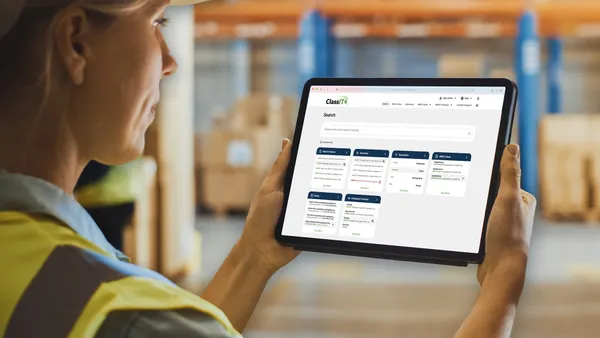Logistics management has entered a new era, marked by the demand for rapid shipping, optimized value chains and real-time adaptability to supply chain disruptions. This flexibility isn’t a nice-to-have. Your organization must be flexible enough to adapt in near-real-time to the frequent supply chain disruptions that your logistics operations will inevitably face.
To embrace this new wave of logistics operations, your systems and technology must be ready to solve complex shipping challenges in a fraction of the time once required. Logistics organizations can harness quantum computing and other next-gen technologies to thrive in this environment.
Here's how.
Fitting quantum computing into the logistics puzzle
Previously confined to the pages of science fiction, quantum computing has become a powerful tool, poised to reshape logistics operations. Unlike classical computers, quantum computers use quantum bits or qubits, representing multiple states simultaneously. This enables them to process vast amounts of data and perform complex calculations at lightning speed. Quantum annealing, a subfield of quantum computing, is particularly relevant to logistics as it helps solve complex optimization problems efficiently.
Managing your logistics operations more effectively could require analyzing the massive volumes of data you acquire every day. Traditional computing methods struggle to process this data quickly, leading to delays and suboptimal decisions. Factors like weather events, traffic and unforeseen delays can disrupt routing and scheduling, making near-real-time data processing crucial.
All these factors combine to make logistics ripe for quantum innovation. Logistics organizations face four key challenges where quantum computing shines:
- Data volume: Quantum computing can analyze vast datasets within seconds, expediting decision-making.
- Complex modeling: It can accurately model complex systems, such as if/then scenarios, to help with predictive aspects of logistics management.
- Urgent decision-making: Quantum computing enables real-time data analysis, enhancing operational efficiency.
- Complexity challenges: Quantum computing solves intricate optimization problems that conventional computers struggle with, such as finding the most optimized routes.
Logistics optimization in real-life
Far from being an aspirational vision, quantum-powered logistics has matured into a practical solution with transformative implications for your operations. Here's an example.
Consider the process of building a unit load device (ULD) or pallets for air or truck shipments and the potential routes that could be taken to reach their final destinations. Your team has an influx of data from various sources, such as crucial information about shipments' dimensions, weight and contents, handwritten notes on damaged packages, and offline decisions made on shipment exceptions. With quantum computing, logistics organizations can process vast amounts of data in near-real-time, enabling you to make data-informed decisions better and faster via logistics optimization and analytics.
Because some of this data is generated offline, your system misses out on important feedback that should be integrated for continuous improvement. But there's a fix. Logistics management systems can collect the data via intelligent process workflows and then use artificial intelligence and advanced analytics to learn and improve the ULD and pallet-building process. And because logistics operations deal with so much data at any given time, adding quantum computing allows this data to be utilized in the timeframe the operations team needs to respond.
Pioneering the new era in logistics management
Are you ready to experience the new frontier of logistics innovation? Unisys is at the forefront of developing next-gen computing capabilities to help organizations extract maximum value from their logistics operations.
Want to learn about groundbreaking advancements in quantum computing, artificial intelligence and advanced analytics in logistics management? Unisys can guide you through the frontiers of next-gen capabilities in logistics. Contact us today to learn more.










